Iran Orders Truckers Not To Travel To Nagorno Karabakh
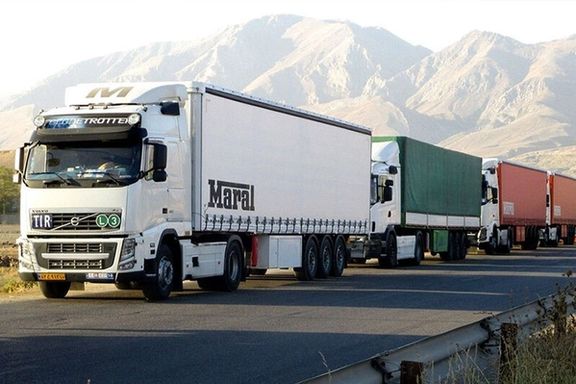
Iran’s Roads and Transportation Agency has banned Iranian trucks from travelling to Nagorno Karabakh controlled by Armenians to avoid Azerbaijani protests.

Iran’s Roads and Transportation Agency has banned Iranian trucks from travelling to Nagorno Karabakh controlled by Armenians to avoid Azerbaijani protests.
In September tensions flared up between Iran and the Republic of Azerbaijan after Baku arrested two Iranian truck drivers, accusing them of going to Nagorno Karabakh that lies within its international borders.
The tensions led to military drills by each side and political mudslinging, including Iranian accusations that Azerbaijan allows an Israeli military and intelligence presence on its territory.
Iran has tried to remain neutral in the conflict between its two northern neighbors but is concerned of more Azerbaijani encroachments on Armenian territory after last year’s war in which Baku took back most of the territories it had lost to Armenia in the early 1990s.
The Agency has told transportation companies not to send trucks to the disputed region from Armenia, reminding them of a foreign ministry directive that entering the region from any point other than Azerbaijani border posts would violate the latter’s territorial integrity.
Most of Iran’s exports to Armenia travel along a road partly controlled by Azerbaijan. Tehran and Yerevan earlier agreed to widen and expand another route that would allow trucks to travel without hindrance.
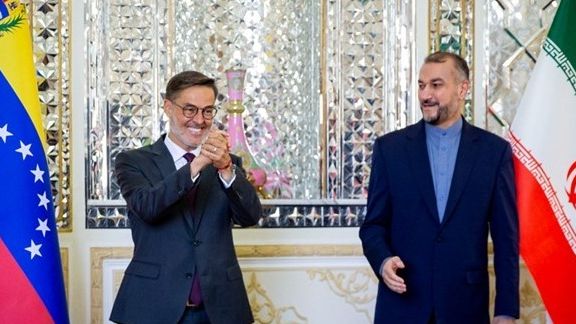
Iranian media and pundits are questioning the government's planned 20-year cooperation agreement with Venezuela and the 25-year strategic agreement with China.
Foreign minister Hossein Amir-Abdollahian said Monday that a 20-year cooperation agreement would be reached with Venezuela during President Nicolas Maduro’s trip to Iran in the coming months. While in Moscow this month, Amir-Abdollahian said Iran was ready for a strategic partnership with Russia.
Tehran and Beijing signed a 25-year strategic cooperation agreement in March under which Iran hopes to attract Chinese investments and bolster diplomatic support. Beijing has balanced a willingness to risk United States sanctions in some areas – especially by continuing to buy Iranian oil – against the strategic interest of many Chinese entities in US markets and by its developing links with Gulf Arab countries and Israel.
Iran’s leaders are keen to show the public that the country is not isolated despite the US ‘maximum pressure’ sanctions imposed since 2018, which led to many international companies, especially energy majors including Total and Royal Dutch Shell, leaving Iran in fear of punitive action by Washington.
But the media is far from convinced. Shargh, the reformist newspaper, Monday quoted Majid-Reza Hariri, chairman of the Iran-China Chamber of Commerce, that the agreement with China has not led to tangible results.
"Not one trade agreement, including in the mining sector, which is one of the areas [of interest for Iran], has been signed so far," Hariri said. He suggested Iranian mining had potential for investment of over $80 billion and the oil sector $400 billion.
In a commentary Wednesday, the reformist Aftab-e Yazd newspaper argued that a long-term agreement with Venezuela could be justified only if Venezuela had considerable global influence, was a strong economy and a good export market, and was able to help Iran circumvent US sanctions or process international financial transactions.
A common antipathy to the US was no justification, the commentary said. "Iran cannot count on Venezuela's help… Venezuela is in deep political crisis and its political system may collapse any minute to give way to a pro-Western government which will mean the agreement with [Iran] will become obsolete.” Aftab-e Yazd urged parliament to “prevent the possibility of damage to the country.”
Speaking to the Iranian Students News Agency (ISNA) Wednesday, former Iranian ambassador to Bolivia, Reza Tabatabaei said Venezuela, which also faces US sanctions, needed the agreement more than Iran.
Tehran could help Caracas sell oil, Tabatabaei suggested, even though “these types of agreements are more a political message than economic.” Facing challenges from the opposition, the Maduro government might turn its back on the agreement to make concessions to the US and help the president stay in power, Tabatabaei argued.
Tejarat newspaper in a commentary Tuesday suggested Tehran might see opportunities to accept payments from Venezuela’s gold reserves, thereby avoiding the dollar. In April there were reports Iran was receiving gold for helping cash-strapped Venezuela rebuild refineries.
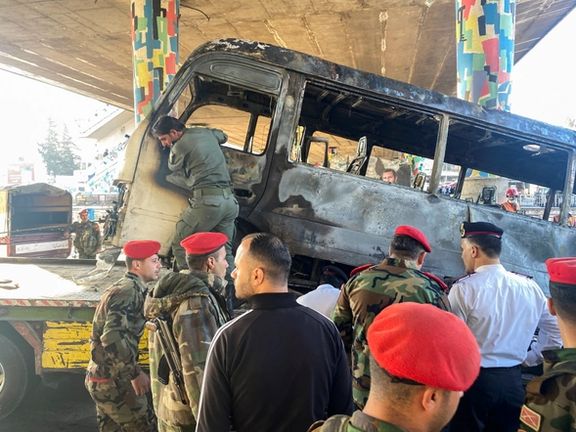
A bomb attack on an army bus in Damascus on Wednesday killed at least 14 people, followed by army shelling in rebel-held Idlib that killed 11 civilians.
The attack on the rebel-held town of Ariha, which took place shortly after the Damascus bombing, had caused the biggest civilian death toll in the Idlib area since March 2020, the Syrian Observatory for Human Rights said.
There was no immediate claim of responsibility for the Damascus bombing, which hit a bus carrying army personnel in the middle of the city at around 6:45 a.m. (0345 GMT), state television reported.
A military source quoted by state media said the bus was blown up by two bombs that had been attached to the vehicle in advance. A third device was defused by an army engineering unit.
Attacks in Damascus have been rare since the army crushed rebel enclaves around the city with backing from Russia and Iran-backed forces in 2018.
Islamic State militants still operate in the deserts of central and eastern Syrian desert, where they have mounted several attacks this year on army vehicles.
Northwestern Syria is the last major stronghold of rebels fighting Assad. The witnesses and rescue workers said shelling struck residential areas of the rebel-held town of Ariha shortly after the Damascus bomb attack.
Turkey's state-run Anadolu Agency said government forces and Iran-backed groups targeted a marketplace in the Ariha town center.
Reporting by Reuters
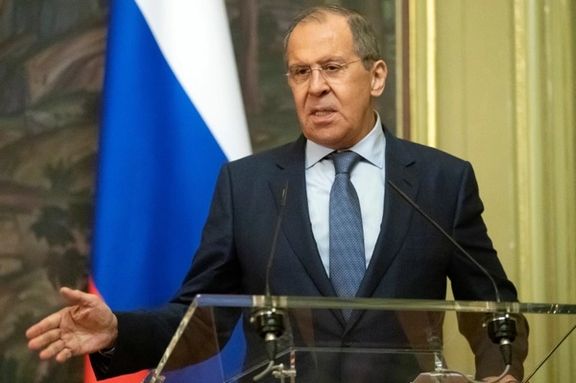
Russia has hosted talks about Afghanistan on Wednesday involving senior representatives of the Taliban, Iran, China, Pakistan and India.
The talks coming amid uncertainty about the impact of the Taliban rule is a round of diplomacy that underlines Moscow's continuing influence in the region.
Opening the meeting, Russian Foreign Minister Sergey Lavrov expressed regret that the United States had chosen not to send a delegation, saying he hoped the US would attend future talks.
He said the Taliban was now in power in Afghanistan and there was no alternative to this for the foreseeable future.
His comments reflected Russian President Vladimir Putin's comments last week that although there should be no rush in officially recognizing the Taliban as the new rulers of the country, it was necessary to engage in talks with them.
Lavrov emphasized the security challenges posed by the Islamic State group and other militants based in northern Afghanistan and noted that drug trafficking from Afghanistan would continue to present a challenge.
Iran has also voiced concern over recent terror attacks targeting the Shiite minority in Afghanistan, attributed to the Islamic State group.
With reporting by AP
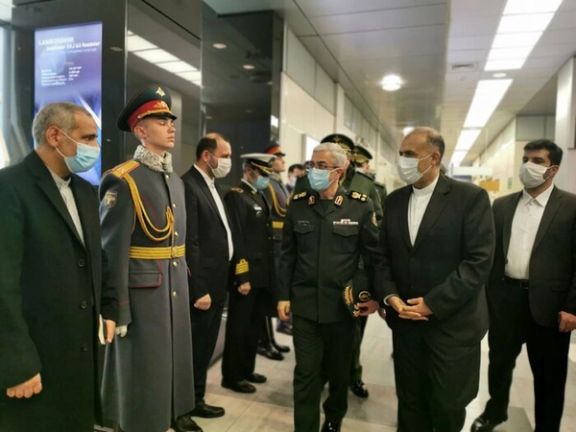
Iran’s military chief of staff who is visiting Moscow has said that Supreme Leader Ali Khamenei attaches “special significance” to expanding ties with Russia.
General Mohammad Bagheri who has been on an official visit to Russia this week told the official government news website, IRNA, that the Russian Iranian military alliance in Syria is an example of extensive cooperation and added, the two countries made a lot of efforts “to protect Syria’s sovereignty”.
Iran entered the Syrian civil conflict as early as 2011, deploying advisors and troops to help the embattled government of Bashar al-Assad. Russia joined the war in 2015 by deploying its air force that together with Iran-organized ground troops largely defeated the rebel forces.
Bagheri went on to say that Russia and Iran have always supported one another on the international arena and “on the military front there is not any kind of misunderstanding and lack of clarity.”
The top Iranian military commander described bilateral relations as “growing and expanding”, insisting that Khamenei and President Ebrahim Raisi (Raeesi) “attach special significance to expansion of relations with Russia.”
Khamenei, who has always spoken against the United States and Western European powers, insists that Iran should pursue an Eastern strategy, developing closer ties with China and Russia.
While he has banned direct talks with the US, and even earlier this year banned American and British Covid vaccines, Khamenei advocates self-reliance and cooperation with non-Western countries and blocks. His beliefs dominate the thinking among his hardline supporters who now control all three branches of the Iranian government.
Bagheri, referring to the United Nations arms embargo on Iran that expired last year, said that Tehran is pursuing arms deals with Moscow and his visit was aimed at discussing agreements. Bagheri added that the joint Russia-Iran military commissions will meet in Tehran in the next three months.
So far, Russia has not publicly committed to supplying new weapons to Iran, but Bagheri said on Monday that agreements have been signed to buy warplanes and helicopters from Russia.
As the fate of nuclear negotiations between world powers and Iran remains unclear, Russia can play a pivotal role in pressuring its ally to be flexible and return to the talks that were suspended in June by Tehran.
Iran, on the other hand, tries to highlight its relations with China and Russia to show the West that it is not so much dependent on an agreement and can save its economy by working with West’s competitors. But except some clandestine oil purchases, China for example has generally respected US sanctions. More than the Chinese government, large companies are wary of going business with Iran, concerned about retaliation by the United States.
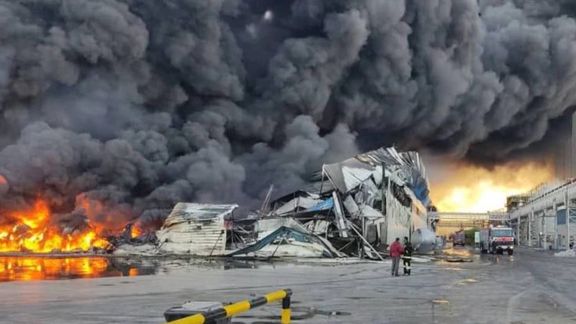
A large blaze with unknown origin broke out in a food processing plant in central Iran early Wednesday that according to local media has destroyed the factory.
The plant processes and packages tea and cooking oil. The fire started at 3:00 am according to the manager of the factory. He described the cause of the blaze as “internal” but gave no further details. According to the local governor, Siamak Soleimani, two people have been injured, but images published show extensive flames raging in the complex.
The packaging section and the warehouse of the plant located in an industrial zone have completely burned down.
Law enforcement personnel and firefighters rushed to the scene trying to battle the fire, but Soleimani told the media that the building was still burning in during rush hour. The police chief in the area was one of the injured persons as he tried to fight the fire.
There have been a series of mysterious fires and explosions in Iran’s nuclear, military and industrial facilities since July 2020.
In one such incident lately, a large blaze broke out in an electrical motors manufacturing factory in Shahre Kord, west-central Iran on September 27.